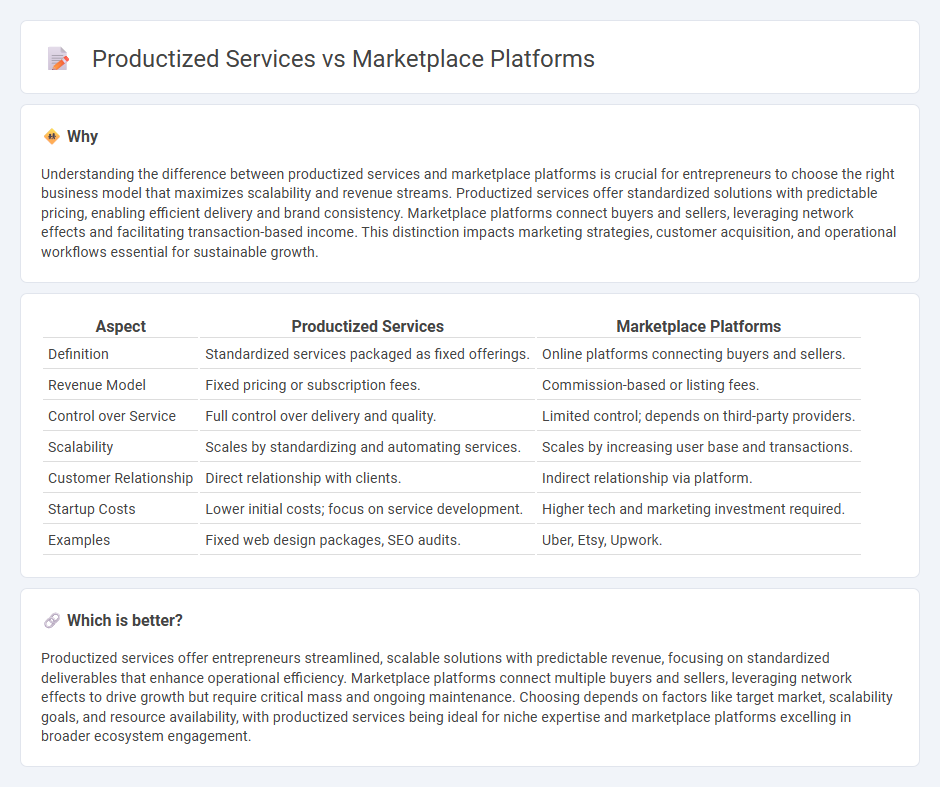
Productized services streamline entrepreneurship by offering standardized solutions that simplify client acquisition and project delivery, enhancing scalability and profitability. Marketplace platforms connect entrepreneurs with a broad customer base, facilitating transactions and expanding market reach while reducing overhead costs. Explore the advantages of each model to determine the best fit for your entrepreneurial strategy.
Why it is important
Understanding the difference between productized services and marketplace platforms is crucial for entrepreneurs to choose the right business model that maximizes scalability and revenue streams. Productized services offer standardized solutions with predictable pricing, enabling efficient delivery and brand consistency. Marketplace platforms connect buyers and sellers, leveraging network effects and facilitating transaction-based income. This distinction impacts marketing strategies, customer acquisition, and operational workflows essential for sustainable growth.
Comparison Table
| Aspect | Productized Services | Marketplace Platforms |
|---|---|---|
| Definition | Standardized services packaged as fixed offerings. | Online platforms connecting buyers and sellers. |
| Revenue Model | Fixed pricing or subscription fees. | Commission-based or listing fees. |
| Control over Service | Full control over delivery and quality. | Limited control; depends on third-party providers. |
| Scalability | Scales by standardizing and automating services. | Scales by increasing user base and transactions. |
| Customer Relationship | Direct relationship with clients. | Indirect relationship via platform. |
| Startup Costs | Lower initial costs; focus on service development. | Higher tech and marketing investment required. |
| Examples | Fixed web design packages, SEO audits. | Uber, Etsy, Upwork. |
Which is better?
Productized services offer entrepreneurs streamlined, scalable solutions with predictable revenue, focusing on standardized deliverables that enhance operational efficiency. Marketplace platforms connect multiple buyers and sellers, leveraging network effects to drive growth but require critical mass and ongoing maintenance. Choosing depends on factors like target market, scalability goals, and resource availability, with productized services being ideal for niche expertise and marketplace platforms excelling in broader ecosystem engagement.
Connection
Productized services streamline entrepreneurship by offering standardized, easily scalable solutions that fit seamlessly into marketplace platforms designed to connect service providers with targeted customers. Marketplace platforms accelerate growth for entrepreneurs by providing access to a vast user base and facilitating transactions through integrated payment and review systems. The synergy between productized services and marketplaces enables efficient service delivery, enhanced customer trust, and increased revenue generation for entrepreneurial ventures.
Key Terms
Network Effects
Marketplace platforms leverage strong network effects by connecting multiple user groups, such as buyers and sellers, creating value that scales with user growth and engagement. Productized services deliver standardized solutions with predictable outcomes but often lack the same viral growth potential due to limited user interdependence. Explore how network effects shape competitive advantages in digital business models to deepen your understanding.
Scalability
Marketplace platforms scale by connecting numerous buyers and sellers, leveraging network effects and minimal incremental costs per transaction. Productized services achieve scalability through standardized, repeatable service packages that reduce customization and operational complexity. Explore how each model's scalability influences business growth and operational efficiency.
Standardization
Marketplace platforms enhance efficiency through standardized processes that enable seamless transaction flows and consistent user experiences across diverse vendors. Productized services emphasize standardization by offering predefined packages with fixed features and pricing, ensuring reliable quality and scalability for clients. Explore how these approaches leverage standardization to optimize business operations and customer satisfaction.
Source and External Links
Best Marketplace Platforms - Marketplace platforms are software systems that connect sellers and buyers, facilitating transactions directly through a website, typically earning commission fees from sales and enabling marketplaces to scale without managing inventory.
Best Marketplace Software to Build a Multi-Vendor ... - Leading marketplace software like Arcadier and Marketplacer offer scalable platforms for multi-vendor marketplaces supporting product, service, rental, and B2B sales, with features like vendor management and integrated payment processing.
Top 20 ecommerce marketplaces in the world in 2025 - The top global ecommerce marketplace platforms include Amazon, eBay, Rakuten, Shopee, and AliExpress, which serve millions of monthly visitors across diverse product categories and international markets.
 dowidth.com
dowidth.com